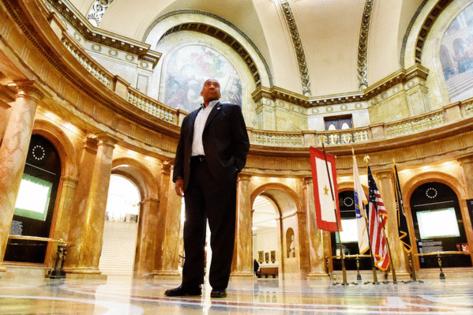Massachusetts lawmakers take up bill to study reparations payments
Published in News & Features
BOSTON — A bill is moving forward at the State House that would establish a special commission to study the feasibility and implementation of reparations payments and to draft a formal apology on behalf of Massachusetts residents for slavery in the United States.
The joint bill (H. 1753), filed by state Rep. Russell Holmes, D-Boston, and state Sen. Liz Miranda, D-2nd Suffolk, was taken up by the Joint Committee on the Judiciary on Tuesday.
If passed, the commission would be tasked with recommending “reparative actions for slavery, its consequences and continued vestiges on residents of African descent,” and serving as the primary resource on the subject of reparations.
As of 2025, no U.S. state or municipality has completed a large-scale reparations program. A number of states and cities have funded reparations programs with payments made through special housing programs for recipients, like in Evanston, Ill. Several have voted to explore establishing a reparations program — including Boston, which has a working Task Force on Reparations where a local group of Black Bostonians has called for $15 billion from the city.
Among other things, the commission would also draft and release a formal apology on behalf of Massachusetts residents for “the perpetration of gross human rights violations and crimes against humanity on African Americans, freedmen and freedwomen and their descendants.”
“What’s important to me is to have a conversation about what has historically happened and have this state admit to the fact that while we were the first to outlaw slavery, but were also the first to begin slavery,” said state Rep. Holmes.
When determining how to carry out state reparations payments, the legislation says the commission will address how any form of compensation can be calculated, with special consideration for African Americans who are descendants of slaves in the U.S., what form of compensation will be awarded to recipients, and how eligibility for the payments will be made.
Naomi Scheman, an Arlington resident and Emeritus Professor of Philosophy from the University of Minnesota, testified before the committee on Tuesday, saying that all white people “owe a debt” to Black Americans.
“Reparations for slavery and its afterlives, which continue to this day, are first and foremost a matter of justice,” Scheman said. “Especially as white people, even those of us whose ancestors arrived in this country after the end of slavery, we benefit in ways large and small from the stolen labor and continuing exploitation of black people. We owe a debt that needs to be repaid.”
State Coordinator of the Massachusetts Chapter of the American Descendants of Slavery (ADOS) Advocacy Foundation Reggie Stewart also testified, calling on Massachusetts to “lead the way in America and provide us with the moral clarity of a nation to move forward.”
“What we’re experiencing today in this country: the weakening of institutions that protect the vulnerable, the hoarding of wealth at the top and the emboldening of racist and authoritarian forces is not a new phenomenon, but it’s rather a modern-day expression and unfinished business from slavery and the legacy it leaves behind.”
When it comes to those who oppose reparations, Rep. Holmes tells the Herald that he’s heard every argument in the book, but the most consistent one is from white people whose ancestors did not own slaves.
“I just think at every level, whenever we have this conversation, what I hear constantly from those who are white whose ancestors did not enslave people to even white people whose families may have enslaved people, say ‘Why should we ever pay this? Why should we be responsible for something we were not a part of,’” Holmes said. “As a descendant of someone who was enslaved, I feel its clear that so much of the wealth of this country has been built on the fact that we had slavery for so long and become the powerful country that we are today. All on the backs of slaves.”
Massachusetts has never been a slave state, becoming the first to abolish the practice in 1783 — six years before the 1789 ratification of the U.S. Constitution, according to the state’s official website. The state says that in 1790, the census report recorded no slaves in Massachusetts.
According to the bill, the commission would have two years to submit its findings and recommendations on reparations payments to the Legislature. The bill requires the commission to address how the recommendations compare to international standards on the remedy for wrongs and injuries caused by a state.
Furthermore, the commission would also analyze how current state laws and policies “continue to disproportionately and negatively affect African Americans, freedmen and freedwomen and their descendants” and how the psychosocial effects of slavery are perpetuated through modern state law.
The commission would consist of at least nine members. It would be required to be made up of an expert on social science and economics, someone from an academic field with expertise in “reparatory justice and sovereignty,” two representatives from a major civil society and reparations organizations that have “historically championed the cause of reparatory justice,” and five people “with respected track records in grassroots organizing.”
The Senate President and House Speaker would be allowed to appoint two members each, while allowing the Attorney General to appoint one member.
On the federal level, Democratic Massachusetts Congresswoman Ayanna Pressley (MA-07) reintroduced a similar bill (H.R. 40) back in February. Originally filed in 1989 and known as the Commission to Study and Develop Reparation Proposals for African Americans Act, the legislation has been re-filed every year since but has never made it out of committee.
The Herald has reached out Sen. Miranda’s office for comment.
------------
©2025 MediaNews Group, Inc. Visit at bostonherald.com. Distributed by Tribune Content Agency, LLC.







Comments